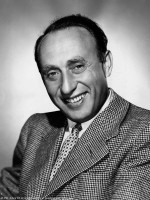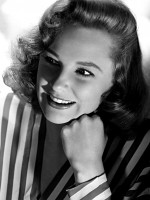José Iturbi est un Acteur Espagnol né le 28 novembre 1895 à Valence (Espagne)
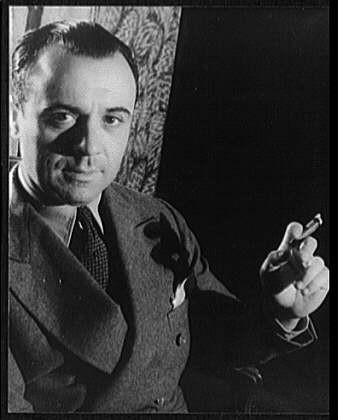
José Iturbi Báguena (28 November 1895 – 28 June 1980) was a Spanish conductor, pianist and harpsichordist. He appeared in several Hollywood films of the 1940s, notably playing himself in the musicals, Thousands Cheer (1943), Anchors Aweigh (1945), and Three Daring Daughters (1948), his only leading role.
Between 1911 and 1937, he was also the frequent accompanist to the Spanish violinist Manuel Quiroga on his international tours. On 8 June 1937, he had just said goodbye to Quiroga after a concert in New York when the violinist was hit by a truck in Times Square, which led to the premature end of his career.
Iturbi made his first appearance as a conductor in Mexico City in 1933 when presented by impresario Ernesto de Quesada from Conciertos Daniel. In April 1936, Iturbi was injured in the crash and sinking of Pan American Airways' Puerto Rican Clipper in Port-of-Spain, Trinidad. After the incident, he said he would not be able to play "for some time", and "I may not be able to conduct again." Later that year, he was named conductor of the Rochester Philharmonic Orchestra in Rochester, New York, serving until 1944. He also led the Valencia Symphony Orchestra for many years. He often appeared in concert with his sister, Ámparo, also a renowned pianist. The liner notes to the two-record box set of Gershwin: Rhapsody in Blue (two-piano arrangements by José and Ámparo Iturbi) read: "Arranged by José and Ámparo Iturbi with the former conducting [the RCA Victor Symphony Orchestra] as well as playing one of the two solo parts ... The arrangers use the two pianos to thicken resonances and to invigorate what was purely orchestral tissue with the bony brittleness of the piano. ... The Iturbis perform this spirited work in a brilliant virtuoso fashion ..." (RCA Victor WDM 1366 (2))
Iturbi was also a noted harpsichordist and made several short length instructional films using the re-emergent early 20th Century French Pleyel et Cie pedaled metal-framed harpsichord made famous by Wanda Landowska.
"I feel that classical music should be a more recognizable part of everyone's entertainment. It has been my hope that through live concerts, motion pictures, recordings, international competitions, and interesting public forums, a larger group of people will learn to love classical music and attend live concert performances".
—José Iturbi, 1950
He appeared as an actor-performer in several filmed musicals of the 1940s, beginning with 1943's Thousands Cheer for MGM and again in Three Daring Daughters in 1948, again playing himself, and starring along with Jeanette MacDonald. He usually appeared as himself in these films. He was later featured in MGM's Anchors Aweigh, which starred Gene Kelly and Frank Sinatra, as well as in several other MGM movies. In the biopic about Frédéric Chopin, A Song to Remember, Iturbi's playing was used in the soundtrack in scenes where Cornel Wilde, as Chopin, was playing the piano.
Source : Wikidata
José Iturbi

- Infos
- Photos
- Meilleurs films
- Famille
- Personnages
- Récompenses
Nom de naissance José Iturbi Báguena
Nationalité Espagne
Naissance 28 novembre 1895 à Valence (Espagne)
Mort 28 juin 1980 (à 84 ans) à Los Angeles (Etats-Unis)
Nationalité Espagne
Naissance 28 novembre 1895 à Valence (Espagne)
Mort 28 juin 1980 (à 84 ans) à Los Angeles (Etats-Unis)
Biographie
Born in Valencia, Spain, Iturbi showed a talent for classical music at an early age. While young, he began musical studies in his native Valencia. He later moved to Paris in order to proceed with his studies with Victor Staub at the Paris conservatory on a scholarship from the Diputació de Valencia. At this time, he also undertook studies in keyboard technique and interpretation with the harpsichordist Wanda Landowska. His worldwide concert tours, beginning around 1912, were very successful. He made his American debut in New York City in 1929.Between 1911 and 1937, he was also the frequent accompanist to the Spanish violinist Manuel Quiroga on his international tours. On 8 June 1937, he had just said goodbye to Quiroga after a concert in New York when the violinist was hit by a truck in Times Square, which led to the premature end of his career.
Iturbi made his first appearance as a conductor in Mexico City in 1933 when presented by impresario Ernesto de Quesada from Conciertos Daniel. In April 1936, Iturbi was injured in the crash and sinking of Pan American Airways' Puerto Rican Clipper in Port-of-Spain, Trinidad. After the incident, he said he would not be able to play "for some time", and "I may not be able to conduct again." Later that year, he was named conductor of the Rochester Philharmonic Orchestra in Rochester, New York, serving until 1944. He also led the Valencia Symphony Orchestra for many years. He often appeared in concert with his sister, Ámparo, also a renowned pianist. The liner notes to the two-record box set of Gershwin: Rhapsody in Blue (two-piano arrangements by José and Ámparo Iturbi) read: "Arranged by José and Ámparo Iturbi with the former conducting [the RCA Victor Symphony Orchestra] as well as playing one of the two solo parts ... The arrangers use the two pianos to thicken resonances and to invigorate what was purely orchestral tissue with the bony brittleness of the piano. ... The Iturbis perform this spirited work in a brilliant virtuoso fashion ..." (RCA Victor WDM 1366 (2))
Iturbi was also a noted harpsichordist and made several short length instructional films using the re-emergent early 20th Century French Pleyel et Cie pedaled metal-framed harpsichord made famous by Wanda Landowska.
"I feel that classical music should be a more recognizable part of everyone's entertainment. It has been my hope that through live concerts, motion pictures, recordings, international competitions, and interesting public forums, a larger group of people will learn to love classical music and attend live concert performances".
—José Iturbi, 1950
He appeared as an actor-performer in several filmed musicals of the 1940s, beginning with 1943's Thousands Cheer for MGM and again in Three Daring Daughters in 1948, again playing himself, and starring along with Jeanette MacDonald. He usually appeared as himself in these films. He was later featured in MGM's Anchors Aweigh, which starred Gene Kelly and Frank Sinatra, as well as in several other MGM movies. In the biopic about Frédéric Chopin, A Song to Remember, Iturbi's playing was used in the soundtrack in scenes where Cornel Wilde, as Chopin, was playing the piano.
Ses meilleurs films
Le plus souvent avec
Filmographie de José Iturbi (7 films)
Acteur
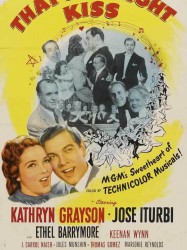
Le Baiser de minuit (1949)
, 1h36Réalisé par Norman Taurog
Origine Etats-Unis
Genres Musical, Romance
Thèmes La musique, Musique
Acteurs Kathryn Grayson, Ethel Barrymore, José Iturbi, Keenan Wynn, J. Carrol Naish, Jules Munshin
Rôle Lui-même
Note64%





La richissime Abigail Budell aurait voulu faire carrière dans l'opéra. Elle reporte ses espoirs sur sa fille Prudence, qui rencontre un camionneur à la voix exceptionnelle.

Cupidon mène la danse (1948)
, 1h55Réalisé par Fred M. Wilcox
Origine Etats-Unis
Genres Musical, Romance
Thèmes La musique, Musique
Acteurs Jeanette MacDonald, José Iturbi, Jane Powell, Edward Arnold, Harry Davenport, Ann E. Todd
Rôle Lui-même
Note61%





C’est pour Tess le jour où l’on délivre les diplômes à l’École pour filles Miss Drakes. Pendant que la chorale exécute sa performance lors de la cérémonie, Tess remarque l’absence de sa mère divorcée, la superbe Louise Rayton Morgan. Louise, éditrice d’une publication de design moderne, est couchée évanouie dans le cabinet du docteur Cannon car elle est surmenée et stressée. À la maison, après la cérémonie de remise des diplômes, le Dr Cannon a un entretien avec les trois filles de Louise, Tess, Ilka et Alix. Il leur dit que leur mère a sérieusement besoin de vacances mais que la seule façon pour elle de se détendre est de partir sans ses filles. Celles-ci sont d'accord malgré la réticence de leur mère, qu’elles convainquent toutefois de partir et elles la voient s’en aller pour une croisière d’un mois à Cuba. De retour chez elles, elles discutent de leur mère, et croient que si elles réussissent à ramener leur père à la maison cela rendra à leur maman le bonheur et la santé. En réalité, Louise leur a caché la vérité au sujet de leur père. C’était en réalité un homme sans cœur, qui les a quittées en laissant Louise élever leurs filles toute seule. Les filles vont trouver le patron de leur père, Robert Nelson, pour savoir où est leur père et le ramener à la maison. Pendant ce temps, au cours de sa croisière cubaine, Louise, rencontre Jose Iturbi, célèbre pianiste et chef d'orchestre. Il est immédiatement conquis par Louise, mais elle joue serré car elle a sa vie devant elle. Lorsque Louise revient enfin à la maison, elle a un secret à dire à ses filles, mais celles-ci ont un secret elles aussi .
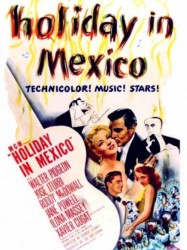
Féerie à Mexico (1946)
, 2h8Réalisé par George Sidney
Origine Etats-Unis
Genres Comédie, Comédie musicale, Musical, Romance
Thèmes Musique
Acteurs Walter Pidgeon, José Iturbi, Roddy McDowall, Ilona Massey, Jane Powell, King Baggot
Rôle Lui-même
Note60%





Christine Evans (Jane Powell), fille de Jeffrey Evans (Walter Pidgeon), qui lui est ambassadeur des États-Unis au Mexique est désignée en tant qu'organisatrice de la fête que son père a prévue. Christine engage le légendaire chef de groupe latin Xavier Cugat et la chanteuse fougueuse Toni Karpathy (Ilona Massey) pour le spectacle malgré l'ignorance du fait que Toni est une ancienne amie de son père (Jeffrey). La confusion romantique règne encore plus lorsque que Christine tombe amoureuse d’un pianiste vieillissant (José Iturbi), qu’une adolescente Yvette (Helene Stanley) tombe pour Jeffrey et que Jeffrey rencontre Toni dans les jours qui précèdent la fête (confusion romantique tout le long du film).

Escale à Hollywood (1945)
, 2h23Réalisé par George Sidney
Origine Etats-Unis
Genres Guerre, Comédie, Fantasy, Musical, Romance
Thèmes La mer, La musique, Transport, Lié à la musique classique, Musique, Forces armées des États-Unis
Acteurs Frank Sinatra, Kathryn Grayson, Gene Kelly, Dean Stockwell, Pamela Britton, José Iturbi
Rôle Lui-même
Note69%





Le film raconte l’histoire de deux marins partant pour un congé de quatre jours à Hollywood. Ils rencontrent le jeune Donald Martin qu'ils reconduisent chez lui. Orphelin, il est élevé par sa tante, Susan Abbott, laquelle s'avère être une belle jeune femme qui, figurante de cinéma, souhaiterait auditionner pour José Iturbi comme chanteuse...
 , 2h4
, 2h4Réalisé par Richard Thorpe
Origine Etats-Unis
Genres Guerre, Comédie, Comédie musicale, Comédie romantique, Musical, Romance
Thèmes La musique, Musique, Politique
Acteurs June Allyson, Gloria DeHaven, Van Johnson, Tom Drake, Henry Stephenson, Henry O'Neill
Rôle lui-même
Note65%





Patsy et Jean Deyo sont deux sœurs qui ont grandi en suivant leurs parents qui chantaient et dansaient dans des tournées à travers le pays. Dès qu'elles en ont eu l'âge, elles ont créé leur propre numéro. Devenues adultes, Patsy, la plus calme et la plus responsable, met souvent en garde sa sœur, qui ne dédaigne pas les flirts occasionnels. Après que Jean, qui veut se marier avec un homme riche, a reçu des orchidées d'un admirateur qui signe « quelqu'un », les deux sœurs essaient, mais sans succès, de repérer cet homme lors de leur spectacle dans un night-club performances. Après le spectacle, elles organisent chez elles une « cantine privée », où elles invitent des soldats et des marins. Elles sont toutes deux attirées par un des marins, nommé Johnny. Lui est attirée par Jean, alors que celle-ci est l'objet de l'attention du sergent Frank Miller. Durant la soirée, Jean montre à Johnny un entrepôt abandonné près de chez elles et dit qu'elles aimeraient bien convertir le bâtiment en une vraie cantine. Le lendemain; elles apprennent par un certain M. Nizby que « quelqu'un » a acheté l'entrepôt pour elles et qu'il paye aussi sa rénovation. Pendant que Patsy et Jean inspectent les lieux, elles découvrent qu'y vit Billy Kipp, un acteur comique populaire qu'elles ont connu dans leur jeunesse. Il y vit seul car sa femme et son fils l'ont quitté des années auparavant.
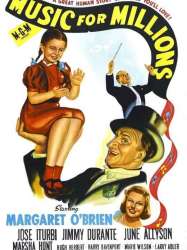
Tendre symphonie (1944)
, 1h57Réalisé par Henry Koster
Origine Etats-Unis
Genres Drame, Comédie, Comédie dramatique, Musical
Thèmes Musique
Acteurs Margaret O'Brien, José Iturbi, Jimmy Durante, June Allyson, Marsha Hunt, Hugh Herbert
Rôle José Iturbi
Note66%





"Mike" (Margaret O'Brien), age 6, arrives in New York to stay with her pregnant older sister Barbara Ainsworth (June Allyson), who lives together with a group of young women, her co-players in a symphony orchestra. As the orchestra prepares to go on a tour of army camps, a telegram is received informing them of the death of Barbara's soldier husband. The girls decide to keep the tragic news from her until after her baby is born. The orchestra is shown playing several classical standards before various military audiences. The talented Iturbi variously conducts the group as well as effortlessly plays difficult piano pieces, while Durante sings comically and acts as a grandfather figure to Mike. In a surprise ending, just after giving birth, Barbara receives a letter from her husband saying he is in good spirits and convalescing in a military hospital.

Parade aux Étoiles (1943)
, 2h5Réalisé par George Sidney
Origine Etats-Unis
Genres Drame, Comédie, Comédie musicale, Comédie romantique, Musical, Romance
Thèmes Bidasses, Danse, La musique, Musique
Acteurs Kathryn Grayson, Gene Kelly, Mary Astor, John Boles, Ben Blue, Frances Rafferty
Rôle José Iturbi
Note62%





Eddie Marsh (Gene Kelly) est un acrobate qui s'est engage dans l'armée à cause de la guerre. Dès ses débuts au régiment il fait la connaissance de Kathryn Jones (Kathryn Grayson), la jolie fille du colonel. Leur relation va rencontrer des obstacles, notamment la désapprobation du père de la jeune fille.
 Connexion
Connexion
